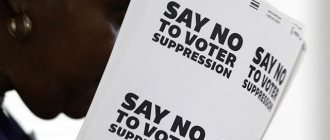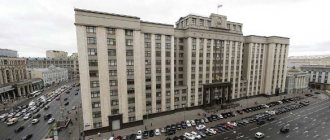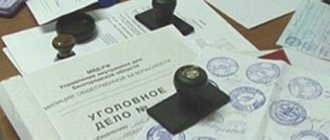ST 142 of the Criminal Code of the Russian Federation.
1. Falsification of election documents, referendum documents, all-Russian voting documents, if this act is committed by a member of an election commission, a referendum commission, an authorized representative of an election association, a group of voters, an initiative group for a referendum, another group of referendum participants, as well as a candidate or his authorized representative , —
shall be punishable by a fine in the amount of one hundred thousand to three hundred thousand rubles, or in the amount of the wages or other income of the convicted person for a period of up to two years, or by forced labor for a term of up to four years, or by imprisonment for the same term.
2. Forgery of signatures of voters, referendum participants in support of the nomination of a candidate, list of candidates nominated by an electoral association, initiative to hold a referendum, or certification of knowingly forged signatures (signature sheets), committed by a group of persons by prior conspiracy or by an organized group, or associated with bribery, coercion, the use of violence or the threat of its use, as well as the destruction of property or the threat of its destruction, or resulting in a significant violation of the rights and legitimate interests of citizens or organizations or legally protected interests of society or the state, -
shall be punishable by a fine in the amount of two hundred thousand to five hundred thousand rubles, or in the amount of the wages or other income of the convicted person for a period of one to three years, or by deprivation of the right to hold certain positions or engage in certain activities for a period of two to five years, or by forced labor. for a term of up to three years, or imprisonment for the same term.
3. Illegal production, as well as storage or transportation of illegally produced election ballots, ballots for voting in a referendum, ballots for the all-Russian vote, absentee certificates -
shall be punishable by a fine in the amount of two hundred thousand to five hundred thousand rubles, or in the amount of the wages or other income of the convicted person for a period of one to three years, or by deprivation of the right to hold certain positions or engage in certain activities for a period of two to five years, or by forced labor. for a term of up to three years, or imprisonment for the same term.
Commentary to Art. 142 of the Criminal Code
1. The subject of the crime is election documents or referendum documents, i.e. duly executed documents entailing the emergence, change or termination of rights and obligations during the electoral process or establishing the results of voting in an election or referendum.
2. The objective side (Part 1) is characterized by action in the form of falsification (i.e. complete forgery, distortion or forgery) of election documents, referendum documents.
3. In Part 2, the objective side involves alternatively provided actions: a) forgery of signatures of voters, referendum participants in signature sheets; b) certification of obviously forged signatures (signature sheets).
The criminal nature of these actions is given either by a special characteristic of the subject composition of the persons committing the crime (a group of persons by prior conspiracy or an organized group), or by the method of committing the crime (bribery, coercion, the use of violence or the threat of its use, destruction of property or the threat of its destruction), or the onset of socially dangerous consequences (a significant violation of the rights and legitimate interests of citizens or organizations or legally protected interests of society or the state).
The crime is completed either from the moment the corresponding actions are committed or from the moment the consequences occur.
4. In Part 3, the objective side is characterized by: a) illegal production of election ballots, referendum ballots, absentee ballots; b) storage or c) transportation of illegally manufactured ballots, ballots for voting in a referendum, absentee certificates.
Commentary on Article 142 of the Criminal Code of the Russian Federation
1. The subject of the crime is election documents or referendum documents (for example, signature sheets).
2. The objective side of the crime (Part 1 of Article 142) is characterized by the action in the form of falsification of election documents, referendum documents, i.e. in their complete forgery, entering false information, substitution of documents, etc.
3. The crime is considered completed from the moment the act is committed.
4. The subjective side of the crime is characterized by direct intent.
5. The subject of the crime is special, indicated in part 1 of the commented article.
6. According to Part 2 of Art. 142 the objective side of the crime is expressed in the following alternative actions:
1) forgery of signatures of voters, referendum participants on signature sheets;
2) certification of obviously forged signatures (signature sheets).
Criminal liability for these acts arises if they are committed by a group of persons by prior conspiracy or by an organized group, are associated with bribery, coercion, the use of violence or the threat of its use, destruction of property or the threat of its destruction, entail the onset of socially dangerous consequences (significant violation of rights and legal interests of citizens or organizations or legally protected interests of society or the state). In the latter case, the crime is completed from the moment the consequences occur.
7. In part 3 of Art. 142 the objective side of the crime is characterized by the illegal production of ballot papers, ballot papers for voting in a referendum, storage or transportation thereof.
8. The subject of the crime (parts 2 and 3 of Article 142) is a person who has reached the age of 16 years.
Second commentary to Art. 142 of the Criminal Code of the Russian Federation
1. The object of the crime is the right of citizens of the Russian Federation to elect and be elected to government bodies and local government bodies, to participate in a referendum, guaranteed by Part 2 of Art. 32 of the Constitution of the Russian Federation, as well as the right to the established voting procedure.
To the election documents specified in Art. 142 of the Criminal Code of the Russian Federation, include: voter lists, signature sheets, voting certificates, ballot papers and other election documents and referendum documents.
2. The objective side of the crime provided for in Part 1 of Art. 142 of the Criminal Code of the Russian Federation, is characterized by the following actions: falsification of election documents or referendum documents. Falsification, i.e. forgery of election documents and referendum documents may involve drawing up false documents, including “dead souls” in signature lists, entering deliberately incorrect information into a genuine document, falsifying it, etc.
3. The subject of this crime can only be a member of an election commission, a referendum commission, an authorized representative of an electoral association, an electoral bloc, a group of voters, an initiative group for a referendum, another group of referendum participants, as well as a candidate or his authorized representative.
4. The subjective side is characterized only by direct intent.
5. Part 2 art. 142 of the Criminal Code of the Russian Federation provides for an independent crime, the objective side of which is expressed in the commission of the actions specified in it (for example, in forging the signatures of voters, referendum participants in support of the nomination of a candidate from the list of candidates nominated by an electoral association).
6. The subject of the crime is a person who has reached the age of 16.
7. The subjective side is characterized by intentional guilt.
8. Part 3 art. 142 of the Criminal Code provides for liability for the illegal production, as well as storage or transportation of illegally produced ballots, referendum ballots, and absentee certificates.
9. The objective side of the crime is expressed in the commission of three acts: 1) illegal production of election ballots, referendum ballots, absentee ballots; 2) storage of illegally manufactured ballots, referendum ballots, absentee certificates; 3) their transportation. The crime is considered legally completed from the moment of commission of any of the listed acts.
10. The subject of the crime is a person who has reached the age of 16.
11. The subjective side of the crime is characterized by direct intent.
Judicial practice: sentences and punishment under Art. 142.2 of the Criminal Code of the Russian Federation
- Resolution of the Plenum of the Supreme Court of the Russian Federation dated... PLENARY OF THE SUPREME COURT OF THE RUSSIAN FEDERATION DECISION dated December 27, 2002 N 29 ON JUDICIAL PRACTICE IN CASES OF THEFT,...
- Resolution of the Plenum of the Supreme Court of the Russian Federation dated... PLENARY OF THE SUPREME COURT OF THE RUSSIAN FEDERATION DECISION of November 15, 2021 N 48 ON THE PRACTICE OF APPLICATION BY COURTS OF LEGISLATION GOVERNING FEATURES...
- Resolution of the Presidium of the Supreme Court of the Russian Federation dated... PRESIDIUM OF THE SUPREME COURT OF THE RUSSIAN FEDERATION DECISION dated December 5, 2018 N 126-P18 ON RESUMING PROCEEDINGS IN THE CASE DUE TO NEW...
- Decision of the Supreme Court: Determination No. 38-АПУ17-2 dated... THE SUPREME COURT OF THE RUSSIAN FEDERATION No. 38-АПУ17-2 APPEAL DECISION Moscow March 1, 2021 Judicial Collegium for Criminal Cases of the Supreme Court...
- Decision of the Supreme Court: Determination N 203-APU17-21... THE SUPREME COURT OF THE RUSSIAN FEDERATION Case No. 203-APU17-21 APPEAL DECISION Moscow August 31, 2021 Judicial Collegium for Military Personnel of the Supreme...
- Resolution of the Plenum of the Supreme Court of the Russian Federation dated... PLENAUM OF THE SUPREME COURT OF THE RUSSIAN FEDERATION DECISION dated December 17, 2021 N 43 ON SOME ISSUES OF JUDICIAL PRACTICE IN CASES...
- Resolution of the Plenum of the Supreme Court of the Russian Federation dated... PLENAUM OF THE SUPREME COURT OF THE RUSSIAN FEDERATION DECISION dated June 25, 2021 N 18 ON JUDICIAL PRACTICE IN CASES OF CRIMES,...
- Ruling of the ECtHR dated 02/14/2017 EUROPEAN COURT OF HUMAN RIGHTS THIRD SECTION CASE “MASLOVA VS. RUSSIAN FEDERATION” (Complaint No. 15980/12) JUDGMENT…
- Judicial Collegium for Criminal Cases, appeal:... THE SUPREME COURT OF THE RUSSIAN FEDERATION Case No. 72-APU 17-21 APPEAL DECISION Moscow October 04, 2021 Judicial Collegium for Criminal Cases...
- Ruling of the Constitutional Court of the Russian Federation dated March 13, 2018 N 578-O THE CONSTITUTIONAL COURT OF THE RUSSIAN FEDERATION RULING dated March 13, 2018 N 578-O ON THE REFUSAL TO ACCEPT A CITIZEN’S COMPLAINT FOR CONSIDERATION...
Falsification of election documents, referendum documents
1. Falsification of election documents, referendum documents, if this act is committed by a member of an election commission, a referendum commission, an authorized representative of an election association, a group of voters, an initiative group for a referendum, another group of referendum participants, as well as a candidate or his authorized representative,
is punishable by a fine. in the amount of one hundred thousand to three hundred thousand rubles or in the amount of wages or other income of the convicted person for a period of up to two years, or by forced labor for a term of up to four years, or by imprisonment for the same term.
2. Forgery of signatures of voters, referendum participants in support of the nomination of a candidate, list of candidates nominated by an electoral association, initiative to hold a referendum, or certification of knowingly forged signatures (signature sheets), committed by a group of persons by prior conspiracy or by an organized group, or associated with bribery, coercion, the use of violence or the threat of its use, as well as the destruction of property or the threat of its destruction, or resulting in a significant violation of the rights and legitimate interests of citizens or organizations or legally protected interests of society or the state, -
shall be punishable by a fine in the amount of two hundred thousand to five hundred thousand rubles, or in the amount of the wages or other income of the convicted person for a period of one to three years, or by deprivation of the right to hold certain positions or engage in certain activities for a period of two to five years, or by forced labor. for a term of up to three years, or imprisonment for the same term.
3. Illegal production, as well as storage or transportation of illegally produced election ballots, referendum ballots, absentee certificates -
shall be punishable by a fine in the amount of two hundred thousand to five hundred thousand rubles, or in the amount of the wages or other income of the convicted person for a period of one to three years, or by deprivation of the right to hold certain positions or engage in certain activities for a period of two to five years, or by forced labor. for a term of up to three years, or imprisonment for the same term.
Comments
Article 142 of the Criminal Code of the Russian Federation covers a crime, the social danger of which lies in an encroachment on the civil right of the population to express their will. The direct object of unlawful behavior is the relationship within which the implementation of this opportunity is carried out. The perpetrators violate the secrecy of voting and create obstacles to establishing the voting results in accordance with the will expressed by citizens.
What the numbers say
31 people were tried for involvement in falsifications. Among them are 18 members of election commissions with voting rights, and 13 people are those who have voted repeatedly, that is, the so-called “carousel voters.”
Criminal cases against 26 people were terminated without rehabilitation, only five were brought to criminal liability.
In the first half of 2021, there were no recorded cases of actual imprisonment of citizens involved in election fraud. The main punishment they suffer is a fine.
At the same time, as we see, most of the violators were able to avoid criminal liability for falsification - criminal cases against 26 people were terminated without rehabilitation.
Commentary on Article 142 of the Criminal Code of the Russian Federation
Part 2 of Art. 32 of the Constitution of the Russian Federation guarantees the right of citizens to participate in elections or referendums. A referendum or free elections are a direct expression of democracy. Falsification of referendum election documents distorts its results and does not allow the true will of the people to be revealed. Therefore, the object of the crime in question is the constitutional right of citizens to express their will, as well as the established procedure for holding elections or a referendum by the organizers or functionaries of the commission for holding a referendum or elections or members of initiative groups.
The subject of the crime is election documents, referendum documents, signature sheets, lists of candidates, election ballots, ballots for voting in a referendum, documents on the right to vote not at the place of residence (absentee certificate).
From the objective side, the crime provided for in Part 1 of Art. 142 of the Criminal Code of the Russian Federation, consists of falsifying election documents and referendum documents.
Falsification of election documents (referendum documents) may involve erasure, making false entries, supplementing them with non-existent data, substituting documents and other distortion of data.
The objective side of the crime provided for in Part 2 of the article in question is the implementation of alternative actions: 1) forgery of signatures of voters, referendum participants in support of the nomination of a candidate, list of candidates nominated by an electoral association, electoral bloc, initiative to hold a referendum; 2) certification of obviously forged signatures (signature sheets).
Forgery of signatures of voters (referendum participants) is considered the execution of signatures on behalf of one person by another person.
To have an objective aspect of this crime, at least one of the following circumstances is necessary: 1) the act was committed by a group of persons by prior conspiracy or by an organized group; 2) bribery; 3) coercion; 4) use of violence or threat of its use; 5) destruction of property or threat of its destruction.
Bribery is considered as payment of funds, transfer of property or items (valuables), performance of services of a property nature, repayment of debt, etc. for committing forgery of signatures.
Coercion is actions aimed at suppressing the will of a person so that he performs certain actions or refrains from committing them at the will of the perpetrator. These can be various kinds of threats (with the exception of those specified in the norm, since in this case the threats form an independent sign of a crime), demotion and other influences in the service, etc. Speaking about coercion, it is necessary, in our opinion, to pay attention to solving the following problem.
In relation to this crime and a number of other elements, the legislator, including in the disposition of the norm an indication of the use of violence or the threat of its use, destruction of property or the threat of its destruction, does not indicate in relation to whom these actions must be carried out for the existence of a crime. Obviously, in relation to the corpus delicti under consideration, the corpus delicti of forgery will be present if there was a threat of violence against a person who had access to election or referendum documents and forged signatures under the influence of the threat. But will this constitute a crime if the same threat was made against the relatives of the specified person? Perhaps not, since the legislator in such cases indicates the relevant victims in the disposition of the relevant norm. However, threats against the victim’s relatives or friends, or even real actions that cause harm to them, are a way of influencing the victim, suppressing his will. Therefore, from our point of view, the actions of the perpetrators in such situations should be regarded as coercion.
Destruction of property involves its destruction or damage, resulting in the complete loss of its consumer properties and economic value.
The threat of destruction of property means a mental impact on the victim, which allows him to assess the possibility of its escalation into the actual destruction of property belonging to or entrusted to him.
Violence is considered to be a physical impact on a person in the form of harm to his health, beatings, and infliction of physical suffering. If the use of violence resulted in harm to health, then additional qualification under articles on crimes against human health is necessary in cases of harm to health of moderate gravity under aggravating circumstances or grave harm to health.
The threat of violence is understood as a mental influence on a person, allowing one to create the impression of a real possibility of using violence against him.
As an alternative to the method of committing a crime, the legislator provides for socially dangerous consequences in the form of a significant violation of the rights and legitimate interests of citizens or organizations or legally protected interests of society or the state.
A significant violation of these rights and legitimate interests is an evaluative concept. Such a violation may involve causing property damage on a large scale, disrupting an election campaign or a referendum campaign, disrupting the activities of a state authority or local government body, undermining the business reputation of a citizen or organization, massive violation of citizens’ rights, etc.
The objective side of the crime provided for in Part 3 of Art. 142 of the Criminal Code of the Russian Federation, is expressed in the performance of the following illegal actions: 1) production; 2) storage; 3) transportation of illegally manufactured ballot papers, ballot papers for voting in a referendum.
Illegal production of ballot papers (ballot papers for voting in a referendum) may consist of production, circulation in excess of the established quantity, or violation of the established procedure, time or place of their production.
Storage refers to the actual placement (possession) of illegally produced ballots with a person, in a home, on the premises of an organization or other places.
Transportation is the movement of illegally manufactured ballot papers (ballot papers for voting in a referendum) from one place to another using any type of vehicle.
The corpus delicti of the crime under consideration is formal, with the exception of the material composition alternatively indicated in part two.
The subjective side is characterized by guilt in the form of direct intent (with a formal composition) and direct or indirect intent (with a material composition). The culprit realizes that he is committing one of the actions provided for in Art. 142 of the Criminal Code of the Russian Federation, and wishes to carry out such actions. The perpetrator must also be aware of the method of committing the crime and have the desire to carry out the actions in exactly this way.
In the material composition, the perpetrator must foresee the onset of socially dangerous consequences and desire or consciously allow their occurrence.
The subject of the crime provided for in Part 1 of the article in question is special. They can only be: 1) a member of the election commission, referendum commission; 2) an authorized representative of an electoral association, electoral bloc, group of voters, initiative group for holding a referendum, other group of referendum participants; 3) candidate; 4) a representative authorized by the candidate.
The subject of the crime provided for in Part 2, general, is a sane person who has reached the age of sixteen. When committing a crime by certifying obviously forged signatures (signature sheets), the subject is a special one. This can only be a person authorized to certify signatures (signature sheets) of persons.
The subject of the crime provided for in Part 3 of Art. 142 of the Criminal Code of the Russian Federation, general - a sane person who has reached the age of sixteen.
Important point
To bring to justice under the norm in question, it is necessary to prove a causal connection between falsification and causing significant harm to the interests and rights of organizations, the state, citizens, and society. The very concept of “significant damage” in this case is of a conditional nature and is considered an evaluative criterion. To establish materiality, it is necessary to examine subjective and objective factors and circumstances. Concepts such as bribery, violent acts, and coercion also require careful interpretation. Individuals who are sane and have reached the age of 16, who commit an unlawful act alone or in complicity, can act as subjects of a crime.
Art. 142 of the Criminal Code of the Russian Federation “Falsification of election documents”
This rule covers various acts. All of them are expressed in an encroachment on the civil right to participate in elections. Criminal liability arises if:
- The ballot paper is deliberately spoiled in order to create obstacles to determining the expression of will.
- Incorrect information about event participants was provided.
- An incorrect list of citizens wishing to express their will has been compiled. We are talking, in particular, about the inclusion of fictitious people in the list of persons who do not have the right to vote.
- Unaccounted forms are included among those used.
- A valid voting ballot with citizens' marks has been replaced by another, filled out in a different way.
- Recorded and used forms were deliberately destroyed.
- Votes were deliberately miscounted.
- The protocols were signed by the commission members before summing up the results.
- The documents were deliberately drawn up incorrectly regarding the results of the event.
- Changes were illegally made to the completed protocols after the announcement of the results.
- The results of the event are deliberately incorrectly determined.
The crime also includes forging the signatures of voters or commission members.







